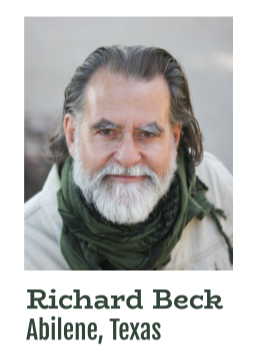See. Do. Be. Free.

Issue 024
An Open Letter to the Community around this year's theme.
Issue 024: Wholeheartedness – “Joy as the Secret to Wholehearted Living” by Richard Beck
As Street Psalms enters its 25th year of forming grassroots leaders in vulnerable communities, we are inviting friends of our work to reflect with us on their own sense of vocation and call. This month Richard Beck reflects on our guiding question:
When did your sense of vocation become real to you and what does it mean for you to show up wholeheartedly in your call when confronted with disappointment, failure, despair, and your own half-heartedness?
As a volunteer chaplain, I lead a weekly Bible study for incarcerated men at the French-Robertson maximum-security unit north of my hometown in Abilene, Texas. In caring for these men, many of whom I’ve known for years, the most anxious time for me comes during the semi-annual lockdowns. One of those lockdowns is, in fact, happening right now as I share this with you.
During these lockdowns, which last for a few weeks, the religious and educational programming of the unit is halted. The men are kept locked in their cells 24/7 as security checks are made, cell by cell, throughout the entire unit. Unable to leave their cells during these weeks, the men experience hunger, boredom, and a rising tide of claustrophobia. As you can imagine, Street Psalms, lockdowns are stressful and unpleasant. And unbearably hot during summer months. During these weeks of separation, I constantly worry about and pray for the men.
After the lockdown ends and we’re allowed back at the unit, I typically start our reunion off by checking on the emotional health of the men, asking how they fared during their weeks locked in their cells. “How was your lockdown? How are you doing? Are you okay?”
The answers are predictable. “It was awful.” “I was going crazy.” One year, though, I was interrupted by a surprising answer from Mr. Kenneth. When I asked Mr. Kenneth about his lockdown, he became rapturous. “I LOVED my lockdown! I always love my lockdown.” This wasn’t the answer I had expected. How could someone love something so horrible and miserable?
Curious and surprised, I asked, “Really!? Everyone hates lockdown, Mr. Kenneth. Why do you love it?” Mr. Kenneth smiled a beatific smile, “I love my lockdown because that’s my quiet time with Jesus. There are no disruptions, no officers or knuckleheads talking to you or messing with you. There’s no schedule. Nowhere you have to go. So, I have all this time by myself to be with Jesus. That’s why I look forward to my lockdowns!”
I shook my head in amazement.
If we, the Street Psalms community, want to find the secret to living a wholehearted life, let me suggest we learn a lesson from Mr. Kenneth’s joy.
And yet, joy is a puzzle. Psychologists who study joy disagree about its proper definition. Some researchers define joy as a positive emotional state, akin to happiness and pleasure. As a synonym for happiness, lots of things in life give us joy. Good news. Success. A lovely vacation. An engrossing hobby. But joy as a positive emotion doesn’t capture what we find so amazing in Mr. Kenneth, nor does it get us to the secret of a wholehearted life.
Simply put, emotions are triggered by external events. Something happens and it elicits an emotional response. Which is great when we are hitting our marks and life feels full and successful. Thankfully, Street Psalms has been blessed with many of these moments over the last 25 years. But what happens to our joy when our days in the trenches of our shared work are filled with frustration, stress, and conflict?
Joy as an emotion is all well and good right up until the moment you find yourself locked in a small, hot prison cell for weeks on end. Or when we are confronted in our work with disappointment, failure, despair, and our own half-heartedness.
Where was Mr. Kenneth’s joy coming from? Clearly, his joy wasn’t coming from his surroundings. Mr. Kenneth’s rapture wasn’t being triggered by events in a stimulus-response sequence. Something else was going on.
Rather than being triggered by events, Mr. Kenneth’s joy transcended events. That contrast—triggered versus transcending—goes to the secret of joy and wholehearted living. There is a joy that goes beyond being a mere “positive emotion,” a joy that goes deeper than mere pleasure. There is a joy that is resilient in the face of failure and disappointment.
But if not a positive emotion, what is joy?
In his influential work on emotions, the philosopher Robert Roberts has argued that joy is what he calls “a concern-based construal.” Let me unpack that.
To start, joy is a “construal.” By that we mean that joy isn’t really a feeling, but is, rather, a perceptual “take” on reality. Roberts uses, as an illustration here, this famous optical illusion:

Do you seek a duck or a rabbit? The image has two “takes.”
Joy, argues Roberts, is like the duck/rabbit illusion. Things happen to us and we construe those events in different sorts of ways. For example, most of the men in the prison construe lockdown as a duck, as wholly miserable. That’s their “take,” their perception of the situation. Mr. Kenneth, by contrast, sees a rabbit. Mr. Kenneth has a very different “take” on lockdowns, a very different way of seeing things. Understood this way, joy is less a feeling than a perception. Joy is a way of seeing the world.
Next, these construals are “concern-based.” That is to say, our perception is affected by what we care about, the things that deeply concern us.
The point, Street Psalms, is that joy is a way of seeing the world through what we care about. This is how we, as the Street Psalm community, can transition joy from positive emotion to transcendent perception, from half-hearted to wholehearted living. True joy is found when we locate our cares and concerns in transcendent goods, and in the bliss and peace we receive in seeking and aligning with those goods.
That’s what Mr. Kenneth had accomplished. Mr. Kenneth didn’t care about confinement or restrictions. About such things, he was unconcerned. Mr. Kenneth had extracted his concerns from his material fortunes and re-located them in a transcendent good. When that happens, joy is no longer affected by negative life events. Rather, as an emotionally stabilizing force, joy confers psychological resiliency in the face of disappointment, setbacks, and failures.
I’m steadier on my psychological feet because, at a deep level, my emotional responses are not 100% reactive to life. To be sure, I will have lots of feelings about my life. As do you. But in possessing an emotional anchor, resting into a deep inner stability, I can keep my footing in the face of emotional tsunamis. Nothing that happens to us today in our work with Street Psalms can dictate or determine our responses. Where everyone sees ducks, we can see rabbits.
When I think of Mr. Kenneth, I think of the New Testament book of Philippians. Like Mr. Kenneth’s reaction to lockdowns, Philippians is a paradox. Known as Paul’s “Letter of Joy,” Philippians is also one of Paul’s prison epistles. Similar to Mr. Kenneth, Paul was somehow experiencing wholehearted living in a situation most of us would find anything but.
How was Paul able to see a rabbit where most would see a duck? Paul calls his answer “the secret”:
I have learned to be content whatever the circumstances. I know what it is to be in need, and I know what it is to have plenty. I have learned the secret of being content in any and every situation, whether well fed or hungry, whether living in plenty or in want. I can do all this through him who gives me strength.
If joy is a concern-based construal, seeing the world through the things we care about, then the secret to wholehearted living boils down to our willingness to tell a bigger story. And for 25 years, that has been foundational to our work at Street Psalms. We have always dared to tell a bigger story.
Dear friends, this is the secret of wholehearted living. We are blessed to share a mission that participates in the Bigger Story.
Like St. Paul and Mr. Kenneth, Street Psalms has always seen rabbits where others have only seen ducks.
Richard Beck (PhD) is Professor and Chair of the Department of Psychology at Abilene Christian University. Richard also teaches classes in the Fuller Theological and ACU Doctor of Ministry programs. Richard’s most recent books are: Hunting Magic Eels: Recovering an Enchanted Faith in a Skeptical Age (Broadleaf Books, 2021). Trains, Jesus and Murder: The Gospel According to Johnny Cash (Fortress Press, 2019) and Stranger God: Meeting Jesus in Disguise (Fortress Press, 2017).

